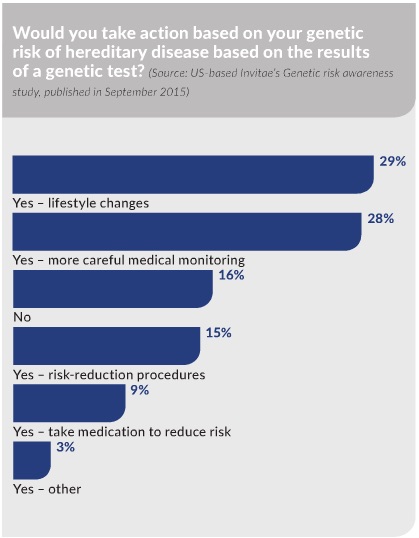
Need to know:
- Testing programmes can range from genetic tests for increased cancer or cardiac risk to analysis of gene variants associated with fitness and nutrition response.
- Robust confidentiality parameters should be established alongside access to emotional and physical support.
- Effective education and communication can help dispel misconceptions and enable individuals to make an informed choice.
In the last couple of years, while far from common, examples have emerged of employers making genetic testing available to their staff. The scope of the offering, and indeed the type of testing, has varied, ranging from predictive genetic testing for increased cardiac or cancer risk to the analysis of genetic markers to develop personalised health and nutrition programmes.
The benefits of including testing within health and wellbeing programmes centre around prevention and risk management, as well as the advantages and potential cost savings of addressing health issues before or in the early stages of development.
Othman Laraki, president and co-founder of Color Genomics, which provides genetic testing for breast and ovarian cancer risk, says: “The risk of a population exists whether you deal with it or not, so if you have a population you will have a certain number of people that carry a high-risk mutation. The main question is: if you’re managing that population, what are you going to do about it?”
Although predictive genetic tests for conditions such as cancer are a marker of risk rather than certainty, the information gained could enable individuals to take proactive measures, such as lifestyle changes or more frequent health checks, where appropriate.
Meanwhile, training and dietary-related genetic tests could help to inform individuals’ wellness approach and thus drive engagement levels, says Andrew Steele, project director at nutrigenetics firm DNAFit. “It’s a new approach to getting [staff] to buy in to corporate wellbeing programmes that an employer might already offer.”
Transatlantic trends
Although not high in number, a large proportion of publicised instances of employers incorporating a form of genetic testing within wellness programmes have been in the US. The 2015 Genentech oncology trend report, published in February 2015, found that 20% of US-based employer respondents’ cancer care coverage already included, or was likely to include, genetic testing and counselling to inform genetic cancer risk in 2015. A further 22% said they were likely to consider this option prior to 2018.
While there may be regional differences between the healthcare market in the US and UK, the framework for genetic testing is not wholly dissimilar, says Wolfgang Seidl, head of health management consulting Europe, Middle East and Africa (EMEA) at Mercer Health and Benefits. “If you peel down to the essence of it then you come to the same financial and particularly legal obstacles in the US as you would see in the UK; there is still a prohibition to discriminate based on genetic information in terms of health insurance coverage and employment,” he explains.
In the US, the Genetic Information Nondiscrimination Act (Gina) prevents discrimination based on genetic information by employers and health insurers. In the UK, under the government and Association of British Insurers’ (ABI) Concordat and Moratorium on Genetics and Insurance, insurers have committed to a voluntary moratorium on the use of predictive genetic test results until 2019.
Testing as an employee benefit
When it comes to serious conditions such as certain cancers or heart disease risk, a consultant-led testing and treatment path may be facilitated by an employer on a case-by-case basis. In such circumstances, preventative surgery might be covered by an employer’s medical insurance policy dependent on certain criteria, says Soraya Chamberlain, director of corporate healthcare at Punter Southall Health and Protection.
However, giving staff the option of testing as an employee benefit is likely to require a different approach. While corporate testing programmes should have strict data protection and confidentiality measures in place, some employees may be uncomfortable directly approaching their employer to request genetic testing. Seidl says: “If an employer wanted to be equitable and respectful of privacy laws it would probably offer [testing] on a voluntary basis as part of a health screening [programme], safeguarded by all of the confidentiality principles.”
Chamberlain adds: “Employers are trying to give individuals real choice; what do they want their benefits packages to look like and what’s relevant to them as individuals. So they might offer [genetic testing] as a choice, but it would likely be flexible benefit-orientated, not employer-paid.”
Employers could also signpost staff to information about testing, enabling individuals to opt to purchase testing services themselves directly from a provider or to simply learn more about the testing process within the private or public healthcare sphere.
Support systems
If an organisation is to include genetic testing in a responsible and beneficial manner within its health and wellbeing strategy, then there are factors to consider beyond the test itself. Mike Blake, compliance director at Willis PMI Group, says: “It’s thinking about what the unintended consequences could be. On the face of it, [genetic testing] sounds great, know your risk, do something about it to reduce your chances of getting a disease, but, in reality, people would worry, even if there’s only a slightly elevated risk.”
In addition to access to medical treatment if needed, employees interested in taking a genetic test, particularly for serious illness risk, will require emotional and psychological support both before and after testing. Russell Stephens, director of marketing, distribution and membership services at CS Healthcare, says: “It really needs to be much more than just adding another employee benefit; it has to be absolutely thought through in terms of the long-term support structure.”
Such support is often of a specialist nature, outside of the usual remit of existing channels within an employer’s health and wellness offering. Many genetic testing providers will include access to genetic counselling as part of their service package. Including genetic counselling within the cost of the test helps to ensure that support is available to everyone who needs it, explains Color’s Laraki.
Providers can also assist in delivering educational information and communication around genetic testing programmes. Although employers do not have access to employee-specific data, perceived privacy issues, as well as misconceptions about genetic testing, can be a cause of concern for staff. “A big challenge is education about what the role of genetics is, and what it’s not,” says Steele.
Looking to the future
Opinion differs on how long it might take for genetic testing to become a more common fixture within corporate wellness programmes. While personalised healthcare, of which the information gained through genetic testing can be seen as a part, has the scope to be hugely beneficial, organisations are yet to exhaust existing, conventional data sets that could help to inform their health strategies, says Seidl. “Also, genetic testing has radically reduced in cost but it’s still not cheap, so there’s still a little way to go before it will hit the level where it becomes relevant to employers to include in their screening programmes,” he adds.
Yet if a strong case can be made for the positive impact genetic testing can have for employers and their staff, including on cost, then interest could accelerate and the market begin to adapt. As Chamberlain says: “I think it will take a couple of years for it to really start to establish itself, but there could be quite a lot of interest in [genetic testing] from certain segments of the corporate market in the next 12 months.”
 Instacart broadens its benefits offering with subsidised genetic testing
Instacart broadens its benefits offering with subsidised genetic testing
US online grocery delivery firm Instacart added genetic testing to its benefits offering in October 2015 when it signed up to the Color Genomics Breast Cancer Pledge to mark Breast Cancer Awareness month. The organisation subsidises 50% of the cost of the test, which analyses 19 genes, including BRCA1 and BRCA2, that are linked to increased breast and ovarian cancer risk. The programme, provided by Color, includes access to support from certified genetic counsellors.
While the scheme is available to all of Instacart’s 325 employees, its introduction was partially driven by a desire to provide a unique proposition for the organisation’s female staff, which make up around 47% of its workforce.
Mat Caldwell, head of talent at Instacart, says: “This is something that we felt was particularly good for our female employees, and which shows that they are extremely important to the organisation and to the community. On top of that, it is an expensive test normally, so we figured that this would be very valuable benefit for our employees.”
The programme was communicated to staff using online and offline communication channels, and Color visited Instacart’s head office in San Francisco to provide educational information about cancer risk and the benefits and limitations of genetic testing. Employees across the organisation’s 17 locations, including those based in its head office, also had access to information sessions offsite should they prefer.
While general information about what is available through the scheme is delivered to all staff, the testing and counselling process is conducted on an individual basis directly through Color to ensure complete confidentiality; no personal data is shared with the employer.
The feedback Instacart has received about the scheme has been positive, and the organisation will continue to offer the programme as part of its commitment to offer a best-in-class benefits programme that supports its employees’ health and enables them to enjoy their life and work. “We’re constantly looking at broadening our benefits plans for our employees,” says Caldwell.
“One of the things that we are very proud of is that we do take care of our employees, and that is something that has been part of the fabric of this organisation since it was founded.”
The firm’s comprehensive health and wellbeing offering includes healthcare, dental, vision, life and disability cover. Instacart also provides healthy snacks and meals for staff, supports employee intramural groups and their involvement in sports leagues such as football and ping pong, as well as operating an unlimited paid time-off policy to give staff flexibility and the time to recharge when they need it.
 Landmark turns to genetic testing to engage staff with fitness and nutrition
Landmark turns to genetic testing to engage staff with fitness and nutrition
In September 2014, Landmark Information Group teamed up with British cyclist Jess Varnish to engage its approximately 400 employees with health and fitness through a week-long cycling challenge, collectively cycling the distance from John O’Groats to Land’s End on exercise bikes.
To coincide with the initiative, Landmark offered staff the chance to participate in a genetically guided wellness programme. Around 70 employees took a DNAFit test, which was made available through a prize draw and further incentive schemes. The test looks at 45 gene variants associated with the body’s response to training and nutrition.
DNAFit came onsite to talk through the test results and provide practical advice on the types of exercise and diet best suited to each individual, as well as tips on how to warm up to reduce risk of injury. These sessions were held on a one-to-one basis or in small groups depending on the preferences of each participant. Educational workshops on genetics, fitness and nutrition were also available for all of Landmark’s staff to attend.
Jacki Norbury, marketing and corporate responsibility champion at Landmark Information Group, says: “Health and wellbeing has always been a focus at Landmark, and as well as encouraging a healthy lifestyle, it’s also about trying to think of ways to engage staff and to help them become more proactive.”
The testing programme and workshops were communicated to staff through an email campaign ahead of the bike week, and the initiative was also discussed by Landmark’s chief executive officer during a monthly soap-box talk. Landmark informed staff what the programme entailed and explained that the process was confidential, with all results correspondence conducted directly between the participant and the provider.
Six months after the initiative was introduced, a survey of participants found that 80% had a higher awareness of their health and wellbeing. Norbury adds: “Two-thirds of those tested confirmed that they had made changes to their diet and over half had modified their existing exercise regime. The programme was good for educating those that were just starting out with exercise but also for those who had been doing exercise for a long time, by giving them some tips on how to modify it.”
Landmark plans to run another bike challenge in 2016, which will include extending the genetically guided programme to more members of staff.
